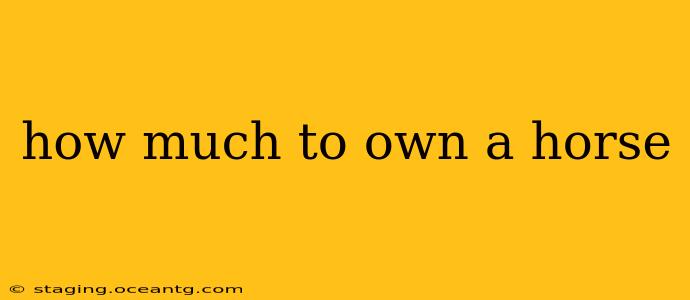Owning a horse is a deeply rewarding experience, but it's crucial to understand the significant financial commitment involved. The costs extend far beyond the initial purchase price and can vary dramatically based on several factors. This comprehensive guide breaks down the expenses, helping you realistically assess whether horse ownership aligns with your budget.
What is the Initial Cost of Buying a Horse?
The price of a horse itself is highly variable and depends on breed, age, training, and bloodlines. A young, untrained horse might cost a few thousand dollars, while a well-trained show horse can easily reach tens or even hundreds of thousands. Don't forget the costs associated with purchasing your horse:
- Purchase price: This is the most obvious expense, ranging from a few thousand to hundreds of thousands of dollars.
- Veterinary exam: A pre-purchase vet check is absolutely essential to identify any potential health problems.
- Transportation: Getting your horse home safely adds to the initial cost.
Ongoing Expenses: A Breakdown of Monthly and Annual Costs
The ongoing costs are where many new horse owners find themselves surprised. Budgeting accurately is vital. Here’s a detailed breakdown:
Boarding:
This is typically the largest single expense. Boarding costs depend heavily on location, facilities offered (e.g., pasture board, stall board, full-service boarding), and the level of care required. Expect to pay anywhere from several hundred to over a thousand dollars per month.
Feed:
High-quality feed is crucial for your horse's health. Hay, grain, supplements, and treats can add up, costing anywhere from $100 to $500+ per month depending on your horse's needs and the cost of feed in your area.
Veterinary Care:
Routine vaccinations, dental care, and preventative medications are essential. Unexpected illnesses or injuries can lead to significantly higher costs. Budget at least $50-$200 per month for routine care, but be prepared for emergencies.
Farrier:
Horses require regular hoof trimming or shoeing. Expect to pay for farrier services every 4-8 weeks, costing between $50-$150 per visit.
Equine Insurance:
While not mandatory, insurance provides a financial safety net in case of illness or injury. Costs vary depending on the level of coverage.
Tack and Equipment:
Saddles, bridles, halters, and other equipment represent a significant initial investment. You'll also need to replace items as they wear out.
Training:
Professional training can be invaluable, especially for younger or less experienced horses. This can be a significant recurring expense.
Miscellaneous:
This category encompasses things like fly spray, grooming supplies, manure removal, and occasional repairs to equipment.
How Much Does it Cost to Own a Horse Per Year?
Putting all these costs together, a realistic annual budget for owning a horse could range from $5,000 to $20,000 or more, depending on your location, the horse's needs, and your chosen level of care.
What are the Hidden Costs of Horse Ownership?
Many potential horse owners overlook these less obvious but equally important expenses:
- Emergency veterinary care: This can be incredibly expensive, easily reaching thousands of dollars in a single incident.
- Transportation costs: Traveling to shows, clinics, or the vet can add up.
- Facility upgrades/repairs: If you own your own property or facilities, be prepared for unexpected repairs and maintenance.
How Can I Reduce the Cost of Owning a Horse?
Several strategies can help keep costs under control:
- Choose a less expensive breed: Some breeds are significantly more affordable to maintain than others.
- Consider pasture board: This is generally cheaper than stall board.
- Learn basic horse care yourself: This can reduce reliance on paid professionals.
- Buy used equipment: This can significantly lower your initial investment in tack and equipment.
- Build strong relationships with your vet and farrier: This can help in managing costs over time.
What are the benefits of horse ownership?
The costs associated with horse ownership are substantial, yet the rewards are undeniable for many. The unique bond with an animal, the physical activity involved in care, and the sense of responsibility are priceless for many horse owners.
This guide provides a comprehensive overview, but it's crucial to research specific costs in your area before committing to horse ownership. Talk to local horse owners and boarding facilities to gain a realistic understanding of the financial implications. Remember, responsible horse ownership requires careful planning and a commitment to providing the best possible care for your equine partner.
